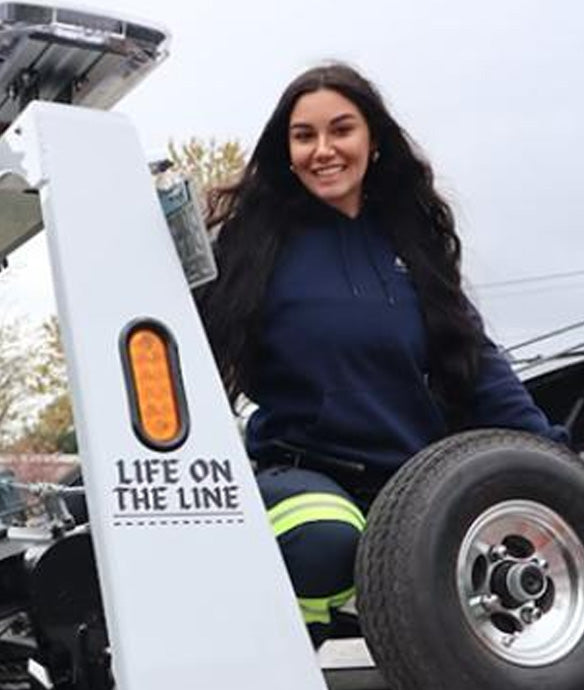
Most people think of police officers, firefighters and emergency medical technicians when they hear the phrase “first responder.” Sacred Heart University health sciences graduate Salena Khan ’23 is on a mission to make the public aware that tow truck drivers also risk their lives daily to keep people safe and should be recognized as first responders.
According to AAA, one tow truck driver is killed every six days in the United States, making towing one of the most lethal professions. Three years ago, tow-truck driver Corey Iodice from Iodice Family Transport was struck and killed on the Merritt Parkway near Exit 47—the exit most people use to get to Sacred Heart’s main campus.
Khan is building Life on the Line, a company dedicated to educating drivers about Connecticut’s Move Over law and fighting for regulatory changes to make tow trucks more visible. “While all first responders are aware of the Move Over law, the public—drivers who need to follow it—either don’t know it or don’t take it seriously,” said Khan. “One more person knowing the law could potentially save someone’s life.”
The law took effect in 2009 and requires highway drivers approaching any stationary emergency vehicles on the shoulder to slow down. Drivers also must move over one lane if they are adjacent to the shoulder, as long as such a move is safe.
Khan plans to focus on educating young people and new drivers so they develop the right habits early on. “Drivers get stuck in their ways. It’s difficult to get them to change the way they drive,” she said.
The Department of Transportation (DOT), fire, police and emergency medical services also are protected by the Move Over law, but their vehicles are more visible to drivers. If DOT employees are out working on the highway, said Khan, there are police officers with them with red and blue lights. In Connecticut, people are numb to a tow truck’s yellow lights and don’t react, she said.
Other states allow tow trucks to display blue or red lights, or both, and Khan wants Connecticut to follow suit. Most motorists, she said, react to blue and red more than the yellow lights currently allowed on Connecticut’s tow trucks.
Khan plans to speak with State Sen. Paul Cicarella, who sits on the Connecticut General Assembly’s Public Safety and Security Committee, about changing the light regulations for tow trucks. “I want them to approve red and blue lights on the backs of tow trucks to make them more visible to oncoming drivers while the vehicle is stationary on the side of the road,” she said.
Khan, whose father owns Nelcon Towing and Recovery, with locations in North Haven, Meriden, Middletown, Southington, Plainville and Berlin grew up in the towing industry and knows about the dangers associated with it. In 2005, her father was on a highway shoulder putting a car on his flatbed when a tractor trailer sped by, blowing him from the truck bed. He was badly cut and needed stitches in his leg.
Khan will sell merchandise, including clothing with logos, through Life on the Line, and a percentage of the profits will be donated to the International Towing and Recovery Hall of Fame and Museum’s survivor fund. Khan’s website is under construction, but information is available on Facebook, Instagram and Tik Tok at lifeonthelineco.
